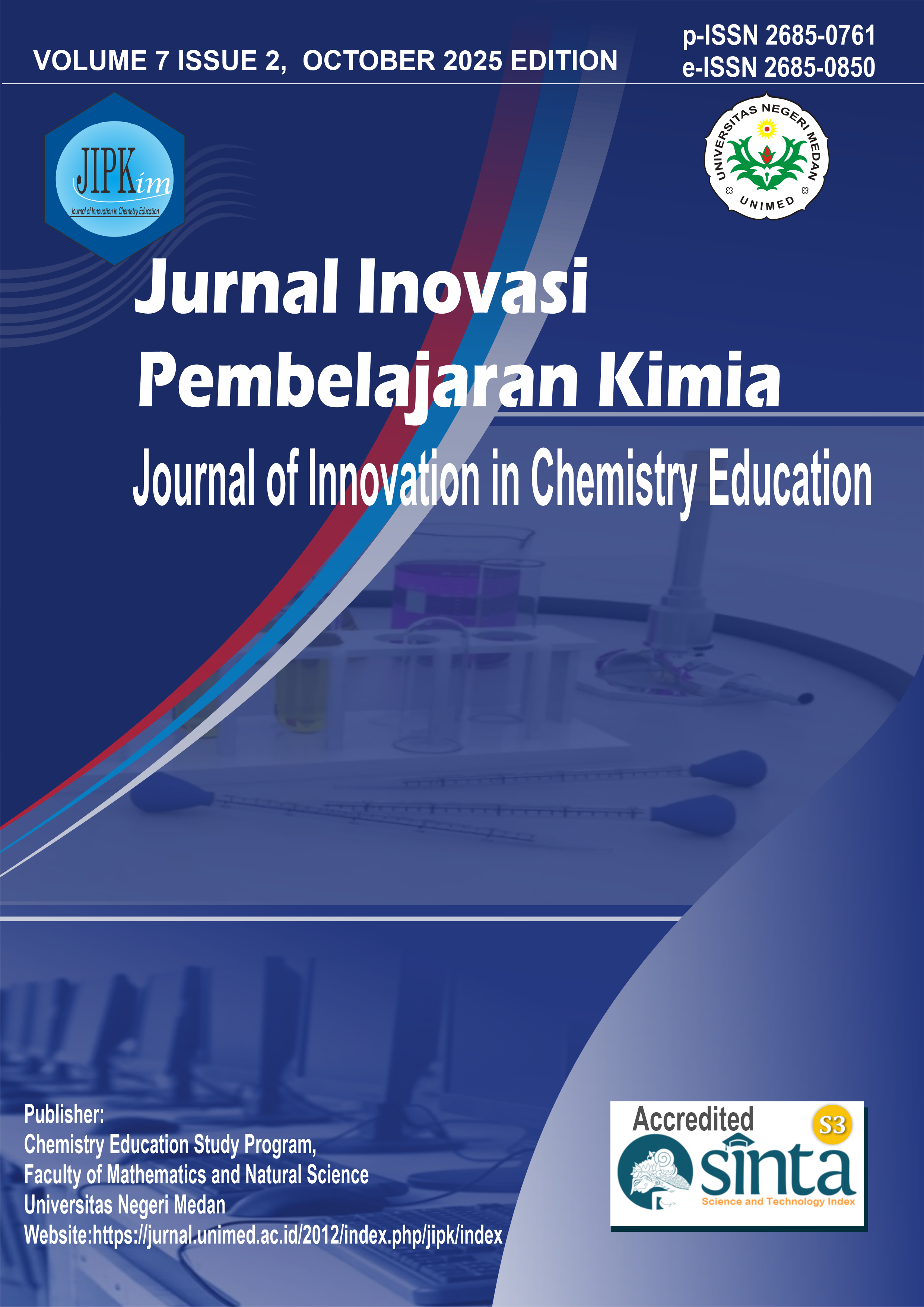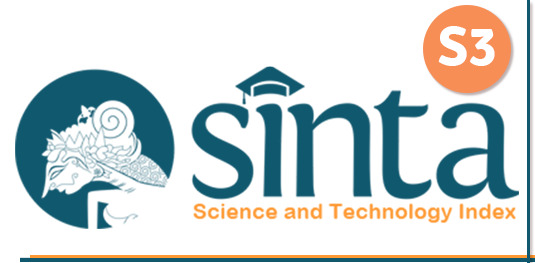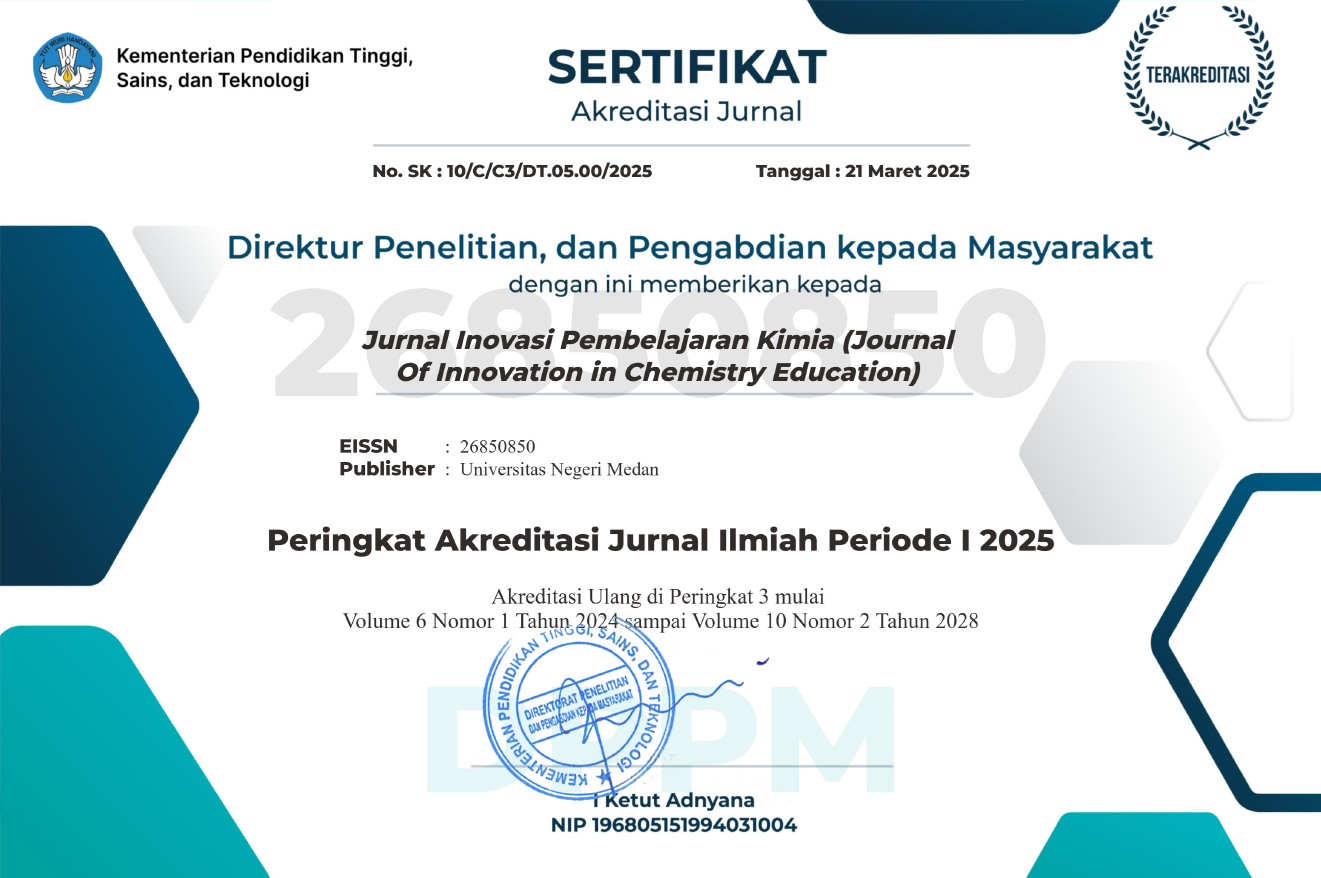A Phenomenology of Project Based Learning in Vocational Analytical Chemistry Education
DOI:
https://doi.org/10.24114/jipk.v7i2.69457Keywords:
vocational education, analytical chemistry, creativity, project-based learning, entrepreneurial motivationAbstract
This study aims to explore the challenges, strategies, and impacts of implementing Project-Based Learning (PjBL) in the Analytical Chemistry program at Vocational High Schools (SMK). Using a qualitative phenomenological approach, data were collected through interviews, observations, and documentation involving teachers and students actively engaged in PjBL activities. The analysis followed Moustakas’s phenomenological steps, including data reduction, categorization, and interpretation. The findings revealed three key themes: (1) resource and infrastructure limitations, (2) teachers’ adaptive and innovative strategies, and (3) students’ creativity and entrepreneurial motivation. Despite facing financial and facility constraints, teachers demonstrated resilience by utilizing local resources, modifying learning designs, and applying reflective assessment. Students, in turn, showed high creativity and problem-solving skills by developing innovative chemical-based products that integrated environmental awareness and entrepreneurship. The study concludes that PjBL effectively enhances students’ higher-order thinking, creativity, and motivation in vocational chemistry learning. However, its sustainability depends on institutional support, adequate funding, and collaboration with industry. These findings highlight the importance of developing structured, project-based digital modules to strengthen teacher competence and ensure meaningful, future-oriented learning in vocational education.References
Aini, N., Rahmadani, D., & Silaban, R. (2022). Project-based learning and creativity enhancement in chemistry education. Jurnal Pendidikan Kimia, 14(2), 123–132. https://doi.org/10.xxxx/jpk.v14i2.XXXX
Anderson, L. W., & Krathwohl, D. R. (2010). A taxonomy for learning, teaching, and assessing: A revision of Bloom’s taxonomy of educational objectives. Longman.
Anjarwati, D., Hermawan, A., & Sutrisno, B. (2016). Strategi guru dalam menghadapi keterbatasan fasilitas laboratorium di SMK. Jurnal Pendidikan Vokasi, 6(2), 145–156.
Arifin, M., & Nisa, Z. (2021). Enhancing students’ higher-order thinking skills through project-based learning. Journal of Education and Learning Research, 3(1), 45–52.
Bell, S. (2010). Project-based learning for the 21st century: Skills for the future. The Clearing House, 83(2), 39–43. https://doi.org/10.1080/00098650903505415
Cahyono, E., & Raharjo, M. (2023). The effectiveness of project-based e-modules in improving vocational students’ creativity and independence. Jurnal Pendidikan Sains Indonesia, 11(3), 405–416. https://doi.org/10.23887/jpsi.v11i3.XXXX
Creswell, J. W., & Poth, C. N. (2018). Qualitative inquiry and research design: Choosing among five approaches (4th ed.). SAGE Publications.
Deci, E. L., & Ryan, R. M. (2017). Self-determination theory: Basic psychological needs in motivation, development, and wellness. Guilford Press.
Dewi, A., & Mulyatiningsih, H. (2013). Pengaruh pengalaman kewirausahaan terhadap motivasi siswa SMK. Jurnal Pendidikan Ekonomi, 2(1), 45–52.
Dwijayanti, R., & Suryana, A. (2021). Vocational teacher strategies in developing creative chemistry projects. Jurnal Inovasi Pembelajaran Kimia, 3(2), 55–64.
Fayolle, A., & Gailly, B. (2015). The impact of entrepreneurship education on entrepreneurial attitudes and intention: Hysteresis and persistence. Journal of Small Business Management, 53(1), 75–93. https://doi.org/10.1111/jsbm.12065
Gopalan, V., Abu Bakar, J., Zulkifli, A. N., Alwi, A., & Mat, R. C. (2020). A review of motivation theories in learning. AIP Conference Proceedings, 2217, 080008. https://doi.org/10.1063/1.5146822
Hadi, F., & Marpaung, M. (2023). Integrating entrepreneurship in chemistry learning through project-based activities. Jurnal Pendidikan Kimia dan Sains, 5(1), 17–26.
Herga, N. R., Kranjc, M., & Pavlovic, M. (2016). Laboratory constraints and student learning in vocational education. Journal of Vocational Education & Training, 68(3), 345–362. https://doi.org/10.1080/13636820.2016.1187016
Hutabarat, W., & Silaban, R. (2020). Barriers and strategies in implementing project-based learning in chemistry education. Jurnal Inovasi Pembelajaran Kimia, 2(1), 55–63.
Kemendikbudristek. (2022). Kurikulum Merdeka: Panduan implementasi pembelajaran abad 21 di sekolah menengah kejuruan. Kementerian Pendidikan, Kebudayaan, Riset, dan Teknologi.
Kolb, D. A., & Kolb, A. Y. (2020). The experiential educator: Principles and practices of experiential learning. EBLS Press.
Krajcik, J., & Blumenfeld, P. (2006). Project-based learning. In R. K. Sawyer (Ed.), The Cambridge handbook of the learning sciences (pp. 317–334). Cambridge University Press.
Lee, C., & Blanchard, M. (2019). Project-based learning to enhance student engagement in science. International Journal of Science Education, 41(9), 1234–1253. https://doi.org/10.1080/09500693.2019.1606352
Lubis, D., & Manurung, R. (2020). Implementation of project-based learning to improve chemistry students’ creativity. Jurnal Inovasi Pembelajaran Kimia, 2(1), 33–40.
Mahmood, S., Hassan, S., & Aziz, N. (2021). Teachers’ readiness and challenges in implementing project-based learning: A case study in technical and vocational education. International Journal of Instruction, 14(3), 101–116. https://doi.org/10.29333/iji.2021.1436a
Manullang, R., & Situmorang, M. (2024). Digital project-based learning to enhance entrepreneurship in analytical chemistry. Jurnal Pendidikan Kimia, 15(1), 1–10. https://doi.org/10.xxxx/jpk.v15i1.XXXX
Miles, M. B., Huberman, A. M., & Saldaña, J. (2014). Qualitative data analysis: A methods sourcebook (3rd ed.). SAGE Publications.
Naibaho, S., & Silaban, R. (2022). Challenges of laboratory-based learning in analytical chemistry at vocational schools. Jurnal Inovasi Pembelajaran Kimia, 4(1), 50–58.
Ningsih, D., & Marbun, R. (2020). The role of teachers in facilitating project-based entrepreneurship learning. Jurnal Pendidikan Vokasi Kimia, 9(2), 75–84.
Panggabean, H., Situmorang, R., & Lestari, S. (2017). Penerapan model pembelajaran berbasis penemuan dengan media interaktif untuk meningkatkan berpikir kritis siswa. Jurnal Pendidikan Sains, 5(2), 101–112.
Permendikbud. (2018). Peraturan Menteri Pendidikan dan Kebudayaan Nomor 34 Tahun 2018 tentang Standar Nasional Pendidikan Menengah Kejuruan. Kementerian Pendidikan dan Kebudayaan.
Pujiyono, P., Nur, R., & Santoso, D. (2015). Pembelajaran berbasis proyek dan pengembangan kewirausahaan siswa SMK. Jurnal Pendidikan Vokasi, 5(3), 221–234.
Rahmadani, D., & Silaban, R. (2021). The implementation of project-based learning in analytical chemistry to improve student motivation. Jurnal Pendidikan Kimia, 13(2), 56–65.
Rosello, F., Garcia, I., & Martinez, J. (2018). Concept maps and innovative teaching strategies to foster creativity in vocational students. Thinking Skills and Creativity, 28, 97–108. https://doi.org/10.1016/j.tsc.2018.02.003
Setiawan, H. (2017). Kompetensi inti kimia analisis di SMK: Fokus pada keterampilan praktis dan laboratorium. Jurnal Pendidikan Kimia, 6(1), 45–54.
Simanjuntak, D., & Manurung, R. (2021). Enhancing students’ entrepreneurial attitude through contextual chemistry learning. Jurnal Inovasi Pembelajaran Kimia, 3(2), 85–93.
Sinaga, M., Situmorang, M., & Hutabarat, W. (2019). Implementation of innovative learning material to improve students’ competence in chemistry. Indian Journal of Pharmaceutical Education and Research, 53(1), 28–41. https://doi.org/10.5530/ijper.53.1.5
Siregar, M., Situmorang, M., & Hutabarat, W. (2021). Enhancing students’ innovation through problem-based chemistry learning. Jurnal Inovasi Pembelajaran Kimia, 3(2), 65–72.
Situmorang, R., Panggabean, H., & Lestari, S. (2018). Pengaruh bahan ajar inovatif terhadap kompetensi kimia siswa SMK. Jurnal Pendidikan Vokasi, 8(1), 56–68.
Sitorus, H., Manurung, R., & Silaban, R. (2021). Project-based learning to foster students’ motivation and scientific process skills in chemistry. Jurnal Inovasi Pembelajaran Kimia (Journal of Innovation in Chemistry Education), 3(1), 22–31.
Sitorus, R., & Silaban, R. (2023). Professional development of chemistry teachers in implementing project-based entrepreneurship learning. Jurnal Inovasi Pembelajaran Kimia (Journal of Innovation in Chemistry Education), 5(1), 11–20.
Sudrajat, D., & Ningsih, M. (2023). Teachers’ pedagogical innovation through project-based e-learning in vocational chemistry. Jurnal Pendidikan Teknologi dan Kejuruan, 16(3), 245–256.
Sulistiyani, N., & Rachman, A. (2020). Integrasi kewirausahaan dalam pendidikan vokasi: Kajian teori dan praktik. Jurnal Pendidikan dan Kewirausahaan, 8(1), 12–23.
Suryani, R., Fadillah, M., & Putra, T. (2021). Pengaruh apresiasi dan pengalaman pemasaran terhadap motivasi kewirausahaan siswa SMK. Jurnal Ilmu Pendidikan dan Kewirausahaan, 9(2), 101–113.
Thomas, J. W. (2000). A review of research on project-based learning. The Autodesk Foundation.
Van Manen, M. (2021). Phenomenology of practice: Meaning-giving methods in phenomenological research and writing (2nd ed.). Routledge.
Widodo, S., Haryanto, A., & Susanto, B. (2020). Strategi guru SMK menghadapi keterbatasan fasilitas laboratorium: Studi kasus di Jawa Tengah. Jurnal Pendidikan Vokasi, 10(1), 33–44.













